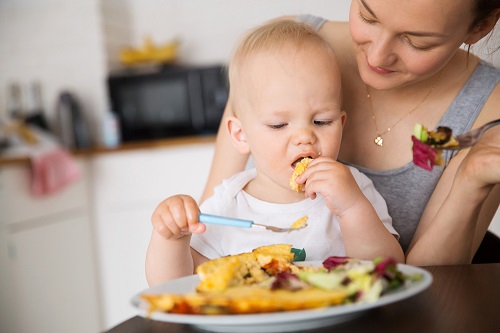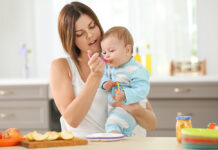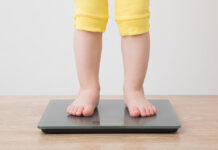This post is also available in: English हिन्दी (Hindi) বাংলা (Bengali)
Giving your baby his or her first taste of solid food is a major step. Most babies are ready to begin eating solid foods as a complement to breastfeeding or formula feeding at the age of 6 months. Here’s what you need to know for introducing solids to your baby.
How can I tell if my baby is ready for solid foods?
Babies are usually ready to start eating solid foods when they can sit up with help, have good control of their head and neck and show an interest in food by leaning forward and opening their mouth when it’s time to eat.
Which food should I start with?

Start with a food that has only 1 ingredient and is mashed up well. Most parents start with baby cereal, fruits or vegetables. You can mix baby cereal with breast milk, formula, or water. Make the mixture thin at first, and use a spoon to feed it to your baby. It is preferable not to use a bottle for semi-solid meals. Spoon-feeding helps to develop your infant’s ability to coordinate mouth and swallowing movements as well as enhance future speech development.
When you start feeding your baby solid foods, give your baby 1 new food every 3-4 days. That way, your baby gets enough time to develop a taste for the new ingredient. This is also a good way to find out which foods your baby is allergic to. After a few days, you can try another food.
The consistency should initially be thin and may be made thicker over time. Cereal (eg. Thin dal or thin rice soup) should be offered initially by spoon in small amounts (one teaspoon [5 mL]) at the end of breast-feeding. You can gradually increase the amount of cereal to one to four tablespoons (15 to 60 mL) twice per day.
Which foods should I give my baby next?
After you give your baby different foods with only 1 ingredient, move on to foods with 2 or more ingredients. For example, you might try yogurt mixed with mashed fruit. Over time, you can give your baby foods that are thicker and have small chunks in them, like pieces of fruit/ roti/pasta or soft cheese. That way, your baby can get used to different foods and learn to chew pieces of food.
How do I know if my baby has an allergy to a food?

Your baby might have an allergy to a food if he or she eats it and then has 1 or more of the following symptoms- skin rash or raised, red patches of skin that are usually very itchy (called hives), swollen lips or face, vomiting or diarrhea, coughing or trouble breathing.
See a pediatrician if your child has any of these symptoms.
Can I make my own baby food?

Yes, it is always better to make your own baby food for a variety of reasons (eg, freshness, increased variety and texture, cost, avoidance of preservatives). Babies don’t need extra salt or sugar in their food so you don’t need to add either. You can use some herbs, seasoning and lemon juice to make it more palatable for the baby.
Are there foods that babies should not eat or drink?
Yes. Babies younger than 1 year old should not drink cow’s milk or eat honey. Certain foods should be avoided in any child under 12 months, including hard, round foods that could cause choking (eg, nuts, grapes, raw carrots, or candies) and honey
Can I give my baby juice? You can give your baby juice in a cup after he / she is 1 year old. But try to restrict the amount as excess can lead to diarrhea and tooth cavities. It is better to give mashed or pureed fruit instead and then cut fruit when the baby begins to chew at around 9 month of age.
When can babies feed themselves? Babies can usually start picking up pieces of food to feed themselves at about 8 to 10 months old. A greater variety of “adult” foods can be offered, including finely chopped, soft foods or “finger foods”.
Does my child need vitamins?
Doctors recommend that all babies receive Vitamin D supplements till 1 year of age. Additionally, iron, multi-vitamin and calcium supplements may be required in pre-term babies. Dosage of the same must be ascertained by a pediatrician.
Till when should I continue to breastfeed?

Mothers should breastfeed their babies till they are at least a year old, keeping in mind the innumerable and incomparable benefits of breast milk over either formula or animal milk. Many mums continue to breastfeed their babies until they turn two. Which is fine as it prevents the baby from being exposed to cow’s milk too early and ensures that babies continue to get all the benefits of breast milk even after solid meals have been started.
By
Dr. Shreya Sharma

This post is also available in: English हिन्दी (Hindi) বাংলা (Bengali)










